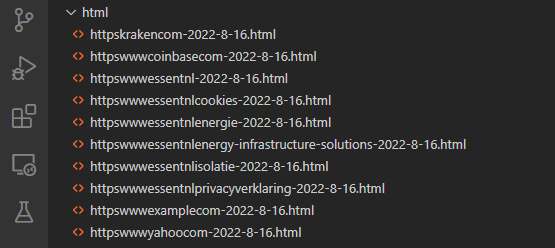Get the entire HTML of a page with Playwright
Scraping and saving the whole entire HTML of a webpage with Playwright is a straightforward task. In the script below:
- start by setting requirements
- set the list of urls
- start the loop
- start browser
- go to url in the list
- get the HTML
- console log the HTML
- slugify the url to create a useable and readable filename
- add date and fileextension to filename
- save HTML file in ‘/html/’ directory
- and done…
const playwright = require('playwright-chromium');
const fs = require('fs');
// urls
const siteList = [
{ site: "https://www.example.com/" },
{ site: "https://www.yahoo.com/" },
{ site: "https://www.coinbase.com/" },
{ site: "https://kraken.com/" },
];
const siteLoop = async() => {
for (const url of siteList) {
console.log('Visit:::::', url.site)
goToUrl = url.site
const browser = await playwright.chromium.launch({ headless: false });
const context = await browser.newContext({});
const page = await context.newPage({});;
await page.goto(goToUrl)
const html = await page.content()
console.log(html)
const slugify = str =>
str
.toLowerCase()
.trim()
.replace(/[^\w\s-]/g, '')
.replace(/[\s_-]+/g, '-')
.replace(/^-+|-+$/g, '');
const today = new Date();
const date = today.getFullYear() + '-' + (today.getMonth() + 1) + '-' + today.getDate();
const fileName = slugify(goToUrl) + '-' + date + '.html';
const dir = './html/';
if (!fs.existsSync(dir)) {
fs.mkdirSync(dir);
}
const path = dir + fileName
fs.writeFileSync(path, html);
await browser.close();
}
}
siteLoop(siteList)Scraping a XML Sitemap with urls
An alternative for inline urls is using a XML Sitemap as a list of urls.
- Start by creating a sitemap.json file in your project root directory
- Copy the nodes from the XML Sitemap, and convert it to JSON format
- Only copy all the ‘<url> … </url>’ nodes you need
- Use an ‘online XML to Json converter’ to convert the XML nodes to JSON format
- Save copied JSON in sitemap.json
- Copy the script below and run it
const playwright = require('playwright-chromium');
const fs = require('fs');
let siteListJson = require('./sitemap.json')
const siteList = siteListJson
// urls
// const siteList = [
// { site: "https://www.example.com/" },
// { site: "https://www.yahoo.com/" },
// { site: "https://www.coinbase.com/" },
// { site: "https://kraken.com/" },
// ];
const siteLoop = async() => {
for (const url of siteList) {
console.log('Visit:::::', url.loc)
goToUrl = url.loc
const browser = await playwright.chromium.launch({ headless: false });
const context = await browser.newContext({});
const page = await context.newPage({});;
await page.goto(goToUrl)
const html = await page.content()
console.log(html)
const slugify = str =>
str
.toLowerCase()
.trim()
.replace(/[^\w\s-]/g, '')
.replace(/[\s_-]+/g, '-')
.replace(/^-+|-+$/g, '');
const today = new Date();
const date = today.getFullYear() + '-' + (today.getMonth() + 1) + '-' + today.getDate();
const fileName = slugify(goToUrl) + '-' + date + '.html';
const dir = './html/';
if (!fs.existsSync(dir)) {
fs.mkdirSync(dir);
}
const path = dir + fileName
fs.writeFileSync(path, html);
await browser.close();
}
}
siteLoop(siteList)
Result scraping entire HTML pages / XML Sitemap
After running either script you should end up with a directory full of HTML files like this:

